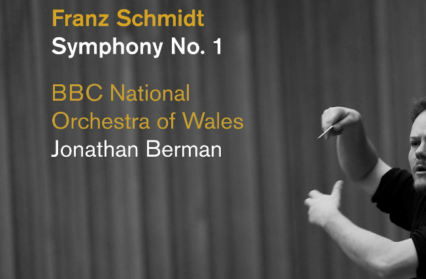David Truslove reviews Symphony No. 1in E major by Franz Schmidt, the latest release from Accentus Music in association with Jonathan Berman, BBC Radio 3 and BBC National Orchestra of Wales.
Just a few months ago the BBC National Orchestra of Wales added another excellent recording to their distinguished portfolio. Their catalogue, in recent years, has shown considerable enterprise in the inclusion of Indian composer John Mayer, the Israeli Paul Ben-Haim and two strikingly different British musical personalities: Ruth Gipps and Gabriel Prokofiev. Now it’s the turn of Franz Schmidt (1874-1939). Although only available digitally, this is the first recording in a proposed cycle of all four Schmidt symphonies, and forms the backbone of a larger project initiated by conductor Jonathan Berman to promote this composer’s music through interviews, televised concerts, radio documentaries, all leading to celebrate his 150th birthday in 2024. Owing to Covid, those plans have been delayed, but recording the symphonies with the BBC NOW will continue this coming November.
So, who was this Austrian composer that history seems to have overlooked? Born in Pressburg (now Bratislava) in Slovakia in 1874, Schmidt joined the Vienna Court Opera Orchestra as a cellist soon after leaving the Vienna Conservatoire in 1896. The first of four symphonies emerged three years later, and it is for these, alongside his oratorio The Book with Seven Seals (1937) for which his name is most remembered. During his day he was much admired by his better-known near contemporaries Mahler, Schoenberg and Strauss, but a certain lack of judgment has undermined his legacy. Three months after Germany’s annexation of Austria, he is said to have given the Nazi salute at the premiere of his oratorio. Later, it is unlikely that informing a young Herbert von Karajan that he had no future as a conductor did much to further Schmidt’s own music.
While Franz Schmidt’s symphonies have never quite made it into the musical premier league, and some would argue his music survives only as a cult phenomenon, there is no shortage of recordings of his symphonies. This recent Berman release is the latest from among a dedicated group of interpreters, including Franz Welser-Möst, Neeme Järvi and, only last year, his son Paavo Järvi and the Frankfurt Radio Symphony Orchestra on Deutsche Grammophon. Berman who studied under Jac van Steen (formerly principal guest conductor at BBC NOW between 2005 and 2013) and his Cardiff team make a strong case for the revival of Schmidt’s overlooked, yet sumptuously scored music.
Premiered in Vienna in 1902, Franz Schmidt’s First Symphony is an expansive and genial work lasting some forty-seven minutes. The work’s grandeur, lyricism and surging romanticism is abundantly served by the BBC NOW, its players responding with warmth and affection to the composer’s stylistic traversal from Bach to Brahms. Debts to Strauss (notably echoes of Don Juan) also appear in the opening movement, its energy and optimism fully realised under Berman’s invigorating baton, with commendably agile strings allied to shapely brass and woodwind phrasing. There’s plenty of grace and elegance in the Brucknerian slow movement, with much to enjoy from sonorous horns and bird-like flute contributions that variously add to its pastoral mood.
If the third movement, marked ‘fast and light’, is somewhat sedate, Jonathan Berman draws some fine string playing for its cantering Waltz. That said, this version lacks the rhythmic bite and finesse of Paavo Järvi and his Frankfurt players on DG who provide more of a steeplechase. But the second of this movement’s two Trio sections under Berman (musicologist Harold Truscott believes there is only one) is wonderfully dreamlike, string tone now perfumed to match the music’s languor. The movement’s Viennese whirl is swept aside by the well-crafted pomp and rigour of the finale. Critics will point to its synthesis of Bach, Mendelssohn and Wagner, but Schmidt rounds off this musically derivative work with style, a quality mirrored by the handsome playing of the BBC NOW.
For those unfamiliar with Franz Schmidt, this recent issue makes a fine introduction and is well worth exploring. However, given the division in recent decades between the repertoire performed in concerts by our professional orchestras and that recorded by them, this project is surely fuelled by a leap of faith and boyish enthusiasm. Only time will tell if Berman and the BBC NOW will advance the course of this neglected composer.
You may also like… Sibelius | Violin Concerto & Humoresques | BBC NOW
David Truslove reviews a timely release from Resonus Classics – a BBC National Orchestra of Wales recording of Jean Sibelius: Violin Concerto, Op. 47 & Humoresques, Opp. 87 & 89, featuring Fenella Humphreys and George Vass.
David Truslove is a critic and regular contributor to Wales Arts Review.











